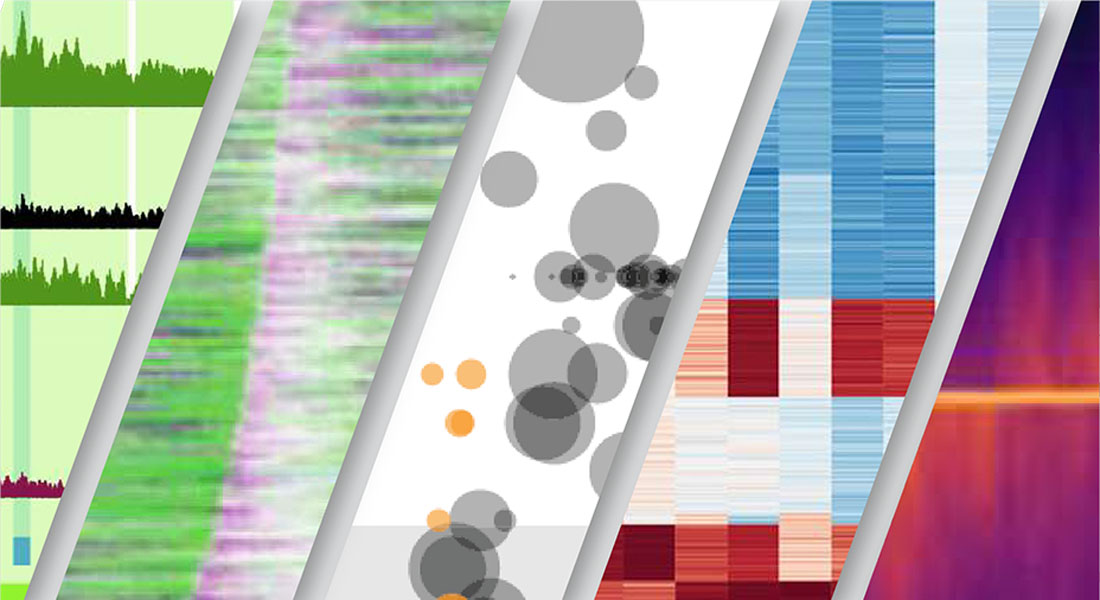Lerdrup Group at CCS
Our research is multidisciplinary and collaborative, and centers on computational studies of functional, structural, comparative genomics and transcriptomics.

At conception, we all inherit a fortune. Six billion base-pairs worth of instructions for how to produce each and every specific component and emerging properties of our cells, body-plan, physiology, mind, and more.
These legacy instructions are the software needed to program the matter we consist of, and they are literally ancient. However, while much of our programming was optimized already a billion years ago, other components has only recently been introduced into our genomes.
The quest to adapt to changing environments and conquer ecological niches demands that all organisms include a certain level of creative destruction, so that fitting changes are inherited in the offspring through trial-and-error.
As with any large and comprehensive set of instructions, our genome therefore contains conflicting, ambiguous, repurposed, obsolete, inflated, suboptimal, and even selfish components.
Every genome therefore has to contain and uphold a range of conflicts of interests and trade-offs, and much of the collective action of DNA-bound factors and epigenetic modifications conceivably serve to ensure a coordinated and appropriate use of the genome.
Our overarching passion is to seek understanding of how inbuilt genomic conflicts of interests are handled by mammalian organisms.
A key interest is to understand the remarkable environment existing when the mammalian oocyte is fertilized and become an embryo. During this process, extensive genomic reprogramming happens, epigenetic marks are rewritten on a global scale, and retrotransposons are allowed to be strikingly active and roam more freely than at any other stage of mammalian life – all factors that can threaten the integrity of the genome (Bhowmick, Lerdrup, Mol Cell, 2022; Sankar, Lerdrup, Manaf et al, Nat Cell Biol, 2020; Dahl et al, Nature, 2016, Manaf, Lerdrup et al, submitted).
Our work has also led to development of a comprehensive software suite for data analysis to increase productivity and deeper understanding of genome-wide data (Lerdrup et al, Nat Struct Mol Biol, 2016, http://easeq.net).
- Establishment of new single-cell and low-input genome-wide methods
- Identification of causes for replication stress in the early mammalian embryo
- Identification of factors instructing the changes in the remarkably different oocyte and embryo epigenome
We are currently looking for post docs and PhD students. Links will be provided here when the advertisements are ready.
We welcome applications from motivated master students.
Please contact us at mlerdrup@sund.ku.dk
- Bhowmick R, Mehta KPM, Lerdrup M, Cortez D. Integrator facilitates RNAPII removal to prevent transcription-replication collisions and genome instability. Mol Cell. 2023, 83(13):2357-2366.e8. doi: 10.1016/j.molcel.2023.05.015.
- Li Y, Wang Y, Vera-Rodriguez M, Lindeman LC, Skuggen LE, Rasmussen EMK, Jermstad I, Khan S, Fosslie M, Skuland T, Indahl M, Khodeer S, Klemsdal EK, Jin KX, Dalen KT, Fedorcsak P, Greggains GD, Lerdrup M, Klungland A, Au KF, Dahl JA. Single-cell m6A mapping in vivo using picoMeRIP-seq. Nature Biotech. 2023, doi: 10.1038/s41587-023-01831-7.
- Hansen SL, Larsen HL, Pikkupeura LM, Maciag G, Guiu J, Müller I, Clement DL, Mueller C, Johansen JV, Helin K, Lerdrup M, Jensen KB, An organoid-based CRISPR/Cas9 screen for regulators of intestinal epithelial maturation. Science Adv. 2023, 9(28):eadg4055. doi: 10.1126/sciadv.adg4055.
- Bhowmick R*, Lerdrup M*, Gadi SA, Rossetti GG, Singh MI, Liu Y, Halazonetis TD, Hickson ID. RAD51 protects human cells from transcription-replication conflicts. Mol Cell. 2022 Aug 18:S1097-2765(22)00706-7. doi: 10.1016/j.molcel.2022.07.010. *) Shared first-authorships
- Maynard S, Hall S, Galanos P, Rizza S, Yamamoto T, Gram HH, Munk SHN, Shoaib M, Sørensen CS, Bohr VA, Lerdrup M§, Maya-Mendoza A§, Bartek J. Lamin A/C impairments cause mitochondrial dysfunction by attenuating PGC1a and the NAMPT-NAD+ pathway. Nucleic Acids Res. 2022, 50 (17), 9948-9965. §) Senior authorship
- Zonderland G, Vanzo R, Gadi SA, Coscia F, Mund A, Lerdrup M, Benada J, Boos D, Toledo LIT, The TRESLIN-MTBP complex couples completion of DNA replication with S/G2 transition. Mol Cell. 2022. Aug 23:S1097-2765(22)00759-6. doi: 10.1016/j.molcel.2022.08.006.
- Sankar A, Mohammad F, Sundaramurthy AK, Wang H, Lerdrup M, Tatar T, Helin K. Histone editing elucidates the functional roles of H3K27 methylation and acetylation in mammals. Nat Genet. 2022 Jun;54(6):754-760. doi: 10.1038/s41588-022-01091-2.
- Shoaib S*, Chen Q*, Shi X , Nair N, Prasanna C, Yang R, Walter D, Frederiksen KS, Einarsson H, Svensson JP, Liu CF, Ekwall K, Lerdrup M#, Nordenskiöld L#, Sørensen CS#. Histone H4 lysine 20 mono-methylation directly facilitates chromatin openness and promotes transcription of housekeeping genes. Nature Comms. 2021 Aug 20;12(1):4800. doi: 10.1038/s41467-021-25051-2. *) Shared first-authorships. #) Corresponding author
- Weis-Banke SE, Lerdrup M, Kleine-Kohlbrecher D, Mohammad F, Sidoli S, Jensen ON, Yanase T, Nakamura T, Iwase A, Stylianou A, Abu-Rustum NR, Aghajanian C, Soslow R, Da Cruz Paula A, Koche RP, Weigelt B, Christensen J, Helin K, Cloos PAC. Mutant FOXL2C134W highjacks SMAD4 and SMAD2/3 to drive adult granulosa cell tumors. Cancer Res. 2020 Jul 8:canres.0259.2020. doi: 10.1158/0008-5472.CAN-20-0259.
- Sankar A*, Lerdrup M*, Manaf A*, Johansen JV, Gonzalez JM, Borup R, Blanshard R, Klungland A, Hansen K, Andersen CY, Dahl JA, Helin K, Hoffmann ER. KDM4A regulates the maternal-to-zygotic transition by protecting broad H3K4me3 domains from H3K9me3 invasion in oocytes. Nature Cell Biol. 2020 Apr;22(4):380-388. doi: 10.1038/s41556-020-0494-z. *) Shared first-authorships
- Agrawal Singh S, Lerdrup M, Gomes AR, van de Werken HJ, Vilstrup Johansen J, Andersson R, Sandelin A, Helin K, Hansen K. PLZF targets developmental enhancers for activation during osteogenic differentiation of human mesenchymal stem cells. Elife. 2019 Jan 23;8:e40364. doi: 10.7554/eLife.40364.
- Flores-Morales A, Bergmann TB, Lavallee C, Batth TS, Lin D, Lerdrup M, Friis S, Bartels A, Kristensen G, Krzyzanowska A, Xue H, Fazli L, Hansen KH, Røder MA, Brasso K, Moreira JM, Bjartell A, Wang Y, Olsen JV, Collins CC, Iglesias-Gato D. Proteogenomic Characterization of Patient-Derived Xenografts Highlights the Role of REST in Neuroendocrine Differentiation of Castration-Resistant Prostate Cancer. Clin Cancer Res. 2019 Jan 15;25(2):595-608. doi: 10.1158/1078-0432.CCR-18-0729.
- Göllner S, Oellerich T, Agrawal-Singh S, Schenk T, Klein HU, Rohde C, Pabst C, Sauer T, Lerdrup M, Tavor S, Stölzel F, Herold S, Ehninger G, Köhler G, Pan KT, Urlaub H, Serve H, Dugas M, Spiekermann K, Vick B, Jeremias I, Berdel WE, Hansen K, Zelent A, Wickenhauser C, Müller LP, Thiede C, Müller-Tidow C. Loss of the histone methyltransferase EZH2 induces resistance to multiple drugs in acute myeloid leukemia. Nature Med. 2017 Jan;23(1):69-78. doi: 10.1038/nm.4247.
- Lerdrup M#, Johansen JV, Agrawal-Singh S, Hansen K#. An interactive environment for agile analysis and visualization of ChIP-sequencing data. Nature Struct Mol Biol. 2016 Apr;23(4):349-57. doi: 10.1038/nsmb.3180. #) Corresponding author
- Dahl JA, Jung I, Aanes H, Greggains GD, Manaf A, Lerdrup M, Li G, Kuan S, Li B, Lee AY, Preissl S, Jermstad I, Haugen MH, Suganthan R, Bjørås M, Hansen K, Dalen KT, Fedorcsak P, Ren B, Klungland A. Broad histone H3K4me3 domains in mouse oocytes modulate maternal-to-zygotic transition. Nature. 2016 Sep 22;537(7621):548-552. doi: 10.1038/nature19360.
- Funa NS, Schachter KA, Lerdrup M, Ekberg J, Hess K, Dietrich N, Honoré C, Hansen K, Semb H. β-Catenin Regulates Primitive Streak Induction through Collaborative Interactions with SMAD2/SMAD3 and OCT4. Cell Stem Cell. 2015 Jun 4;16(6):639-52. doi: 10.1016/j.stem.2015.03.008.
Ian David Hickson, DNRF Center for Chromosome Stability, University of Copenhagen, Denmark
John Arne Dahl, Department of Microbiology, University of Oslo, Norway
Arne Klungland, Department of Microbiology, University of Oslo, Norway
Deo Pandey, Department of Microbiology, University of Oslo, Norway
Claus Storgaard Sørensen, BRIC, University of Copenhagen, Denmark.
Rahul Bhowmick, Dept. of Biochemistry, Vanderbilt University, USA
The Danish National Research Foundation
The Novo Nordisk Foundation
The Norwegian Research Council
EaSeq:
EaSeq is a software environment developed for interactive exploration, visualization and analysis of genome-wide sequencing data – mainly ChIP-seq. Combined with a comprehensive toolset, this offers quick and nimble interpretation and understanding of genome-wide data.
EaSeq is a what-you-see-is-what-you-get data visualization tool where you nimbly can switch back and forth between studying individual genomic loci (similar to a genome browser) and thousands of loci at a time. EaSeq contains a variety of analysis and visualization tools, such as peak-finding, quantitation, normalization, clustering, distance analysis, randomization, scoring, heatmaps, genome browser tracks etc., so file transfers and format conversions are minimized.
PhD course in ’Analysis of genome-wide enrichment data’
The group organizes this recurring PhD course, which teaches PhD students to analyze a range of genome-wide sequencing datasets, where the interesting information is not in the DNA-sequence itself, but rather the abundance and distribution of sequences within the genome (including methods such as ChIP-seq, ATAC-seq, RIP-seq, CUT&RUN, and many more). The end goal is that students are capable of autonomously undertaking key steps in the analysis, integration, and interpretation of your own and others ChIP-seq, ATAC-seq or similar data. The course consists of a mix of lectures, hands-on exercises, and project work. There are no requirements for prior experience with these or related skills, and all work will be performed in graphical user interfaces, so more classical computational skills (read script-writing) is not a requirement.
https://phdcourses.ku.dk/DetailKursus.aspx?id=110329&sitepath=SUND
Consultant for and founder of Genessence (CVR: 21376787) for consultant activities and commissioned software development.
Group Leader
 Mads Lerdrup
Mads Lerdrup
Associate Professor
mlerdrup@sund.ku.dk
(+45) 35 32 57 46
CV, Publications, etc.
